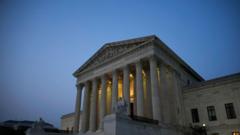In a significant hearing, the US Supreme Court examines the Trump administration's push to abolish birthright citizenship, amidst concerns over its constitutionality and potential statewide inconsistencies. With various states opposing the move, the justices grapple with the authority of lower courts and implications for immigration law.
Supreme Court Weighs Trump Administration's Birthright Citizenship Challenge

Supreme Court Weighs Trump Administration's Birthright Citizenship Challenge
The US Supreme Court deliberates on President Trump's attempt to end birthright citizenship amidst legal opposition and broader implications for immigration policy.
The US Supreme Court engaged in a pivotal hearing regarding President Donald Trump's controversial order to eliminate birthright citizenship, a case that stands to impact his broader immigration agenda. The constitutional debate centers on whether lower courts should have the authority to block a presidential directive nationwide, as exemplified by ongoing legal challenges to Trump's citizenship order.
The arguments unfolded with US solicitor general D John Sauer representing the Trump administration, contending that judges have overstepped their bounds in placing nationwide injunctions. He proposed the adoption of class-action lawsuits as an alternative that could address executive enforcement. However, opposing arguments, characterized by New Jersey's solicitor general Jeremy Feigenbaum, warned of the chaos stemming from a fragmented citizenship system if the Supreme Court decided in favor of the administration.
During the oral arguments, justices raised concerns about the practicality and constitutionality of removing nationwide injunctions, and whether these actions would intensify existing legal confusion surrounding citizenship. Justice Elena Kagan pointedly noted that the administration had faced repeated losses on this issue in lower courts. Meanwhile, Justice Samuel Alito expressed skepticism regarding the authority of lower courts to issue broad rulings.
Amid the courtroom proceedings, protestors gathered outside, with figures like former House Speaker Nancy Pelosi vocalizing public dissent over Trump's immigration policies. The unique timing of the Supreme Court hearing in May, and the lack of clarity surrounding a ruling timeline, adds another layer of uncertainty.
Legal experts underscore a significant obstacle for the administration — the argument that the president cannot unilaterally alter the citizenship guarantee embedded in the 14th Amendment, which assures citizenship for all individuals born or naturalized in the US. Trump's assertion regarding the limitations of the phrase "jurisdiction thereof" — suggesting it excludes children of undocumented immigrants — has faced fierce opposition from established precedents.
Federal courts in Maryland, Massachusetts, and Washington DC have issued injunctions blocking the enforcement of Trump’s directive. The administration's challenge aims to restrict injunctions so they apply only to named plaintiffs, striving for the ability to implement aspects of the order amidst ongoing legal disputes.
The potential repeal of birthright citizenship could affect significant numbers of children within the US, according to various lawsuits warning that it could impose a "second-class status" on them. Concerns have been raised about deportation complications, as some children might not be accepted back by their parents' home nations.
Legal discussions around the presidential ability to impose sweeping immigration changes through executive orders are likely to reshape the landscape of US immigration policy, ushering in continued debates about birthright citizenship amid protests and legal challenges.






















